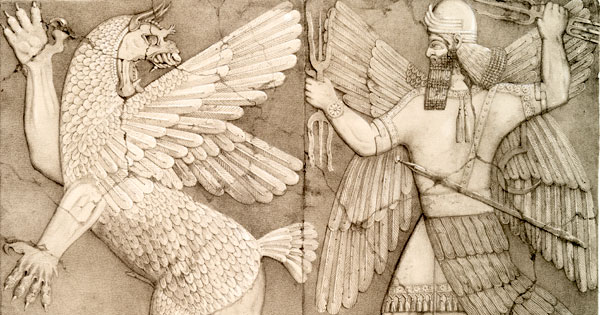
Marduk, Chief God of Babylon, with his thunderbolts destroys Tiamat the Dragon of Primeval Chaos.
The first chapters of Genesis were not written to communicate history or science. Creation stories had an entirely different purpose in the Ancient Near East. They were written to give people a vision of their place in the world, and to help them make sense of existence. In other words, they gave people a narrative in which they could live their lives. This is not an outdated idea, as people today still live within functional narratives that cause them to see the world in a certain way. Perhaps the most forceful element of all creation stories is that they explain the essence of what it means to be human.
One creation story that was written before Genesis is the Babylonian creation tale, known as the Enuma Elish. This story has its own way of explaining humanity. The god Marduk kills the goddess of primordial chaos, Tiamat, and forms the heavens and earth from her body. He then kills one of Tiamat’s sons, a rebellious god named Kingu, combines Kingu’s blood with clay, and fashions humans from this mixture. Marduk creates humans to be slaves, in order to do the dirty work so that the gods could be free to enjoy leisure. The picture of what it means to be a person in this story is that human beings are innately worthless and consigned to endure the evil curse of labor without any meaning. This is a story in which many people still live today.
The format used in the opening chapters of Genesis clearly resembles the Enuma Elish, but it tells a completely different story. Instead of God mixing the blood of a dead god with clay to make people, the God in Genesis simply breathes his own life into humanity with no struggle. Rather than making them slaves, this God makes them his image-bearers, meaning that humans are to be his ambassadors, and that they bear irrevocable worth. Contrary to seeing work as a bad thing, this God works, creates, cultivates, and then creates humans to be his co-creators, stewards, and caregivers to the creation. This presents an entirely new way of being human.
Many religious motifs today tell the first story rather than the second. Sadly, many of these are even done in the name of Christianity. Somewhere along the way, followers of Jesus fumbled the plot of the story. The reason the creation narrative in Genesis is so profound is because it paints a picture in which humans are sacred and hold incomputable value. It sounds strange to talk about people being valuable under the banner of religion, because so much of religion has been fueled by denigrating people and shaming them into conformity and submission. It is a wonder that some religious folks still have the fortitude to wake up in the morning when they’ve been taught to see themselves as worthless garbage.
The Jesus tradition rests on the shoulders of the Jewish belief that human life is holy and incontrovertibly precious. Yet, the world is paradoxically broken, and the humans who possess unsurpassable worth are capable of hideous, vile things. The mission of Jesus is not to throw everything out, or incinerate everything with condemnation, but to reclaim that which is good, restore what has been distorted, and redeem what has been squandered. While there is wreckage and turmoil in the world, the signature of God in each person still remains intact, and Jesus has come to lead us into a world in which all people recognize themselves and others as sacred.
In the beginning, God said that everything was good. In the end, God will say that everything is still good, and nothing will be lost. The message of Jesus is that we are on our way there, that we are all called to invest in this new creation, and that this hope will ultimately win out. And that is Good News.
Image via NYPL Digital Collections.
About Zach Christensen
Zach Christensen lives in Fremont, Nebraska with his lovely wife. He is on the final semester of his Master of Arts in Theological and Biblical Studies and is a full time social services worker.
Leave a Reply